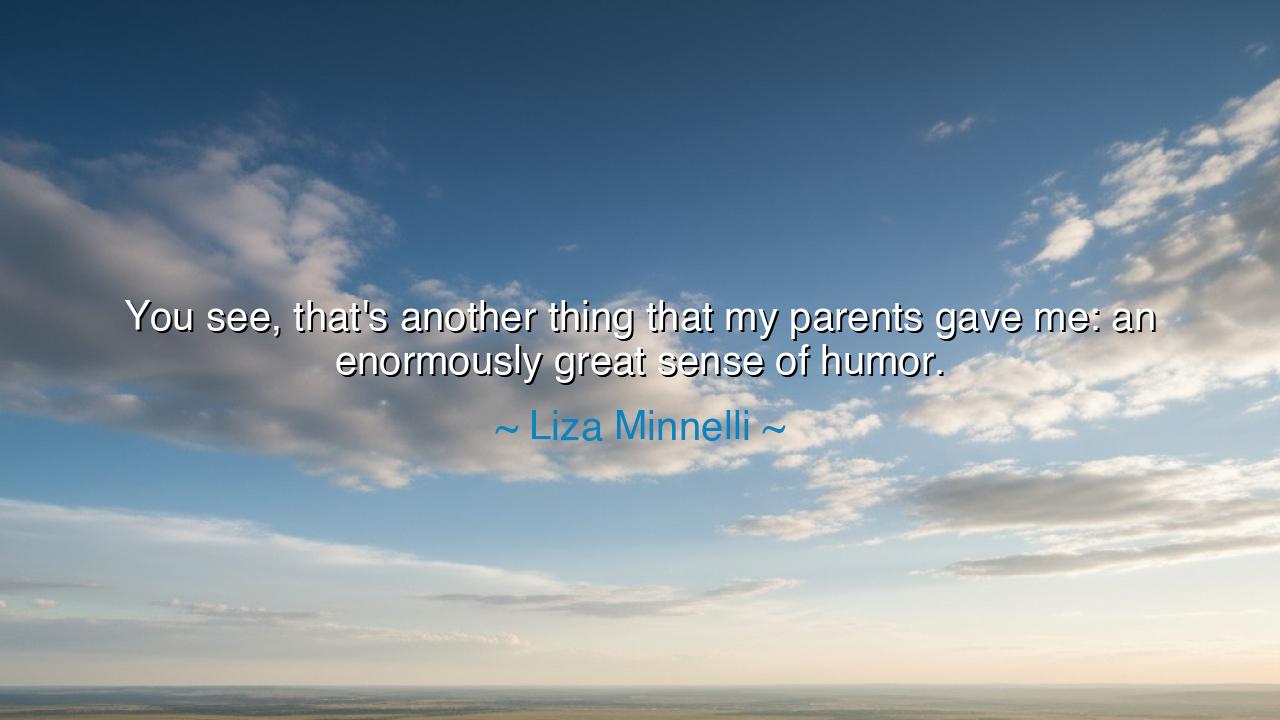
You see, that's another thing that my parents gave me: an
You see, that's another thing that my parents gave me: an enormously great sense of humor.






In the tender yet spirited words of Liza Minnelli, the daughter of stars and a star in her own right, there lies a truth both timeless and profound: “You see, that’s another thing that my parents gave me: an enormously great sense of humor.” Though simple in sound, this confession holds the echo of generations—the wisdom that joy, when inherited and cultivated, is one of the greatest gifts a soul may receive. For beauty fades and fame trembles, but humor, that golden light of the heart, endures even in sorrow’s shadow.
Liza’s lineage was touched by brilliance and burden alike—her mother, Judy Garland, the radiant songbird of The Wizard of Oz, and her father, Vincente Minnelli, the master of cinematic dreams. From them, she inherited not only talent but the storms that often accompany it. Yet amid fame and fragility, she speaks of humor as a sacred inheritance. This is no idle laughter of the foolish, but the laughter of the wise—the kind that rises from pain and transforms it into music. Her words remind us that humor is not mere amusement; it is the art of survival, the alchemy of turning despair into strength.
The ancients, too, knew of this magic. In the days of Marcus Aurelius, when emperors ruled with both sword and philosophy, there was a saying: “The soul becomes dyed with the color of its thoughts.” To bear a sense of humor, then, is to dye the soul with light. It does not deny the darkness; it redeems it. When tragedy comes, humor becomes the shield that keeps the heart from breaking, the melody that carries the weary spirit across the storm. Thus, what Liza calls her inheritance is not laughter alone—it is resilience clothed in laughter, the divine ability to smile through tears.
Consider, too, the story of Winston Churchill, who guided his nation through the burning years of war. When all of Europe trembled beneath the shadow of tyranny, Churchill met fear not only with courage but with wit. “If you’re going through hell,” he said, “keep going.” His humor was not born of levity but of strength—it steadied those around him and reminded the weary that hope could still be found in laughter. Like Liza, he understood that humor is not weakness; it is a flame that refuses to be extinguished.
In every family, every life, there are inheritances that do not appear on paper. Some pass down wealth, others sorrow, but the greatest legacies are invisible: kindness, joy, and the ability to laugh. These gifts, once received, can ripple across generations, healing what might otherwise remain broken. When Minnelli speaks of her parents’ gift, she offers a map for the heart—showing us that laughter, born of love, is the truest inheritance of all.
So, let this teaching be carried forward: Do not scorn laughter, for it is the breath of the soul. Cultivate it in your homes, your friendships, and your own reflections. When the world weighs heavy, when the heart seems weary of its trials, remember that humor is not escape—it is courage in disguise. It whispers to the sorrowful: “You are still alive. You can still see beauty, still find joy.”
And to those who would seek wisdom, hear this final truth: life will offer you many things—some bright, some broken—but what you choose to keep defines who you become. Keep your humor, then, as Liza kept hers. Let it be your armor and your art, your comfort and your rebellion. For the one who can laugh through tears has already conquered despair, and the one who carries humor in the heart walks always in the light, no matter how long the night may last.






AAdministratorAdministrator
Welcome, honored guests. Please leave a comment, we will respond soon